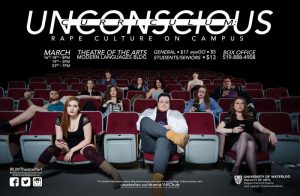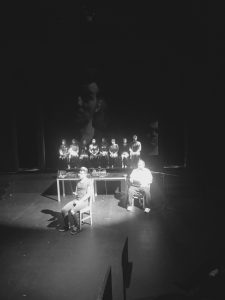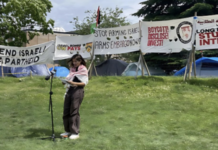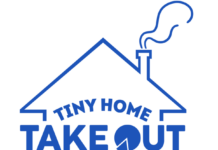When sexual violence is considered the norm in any society, where people are taught not to be raped instead of not raping others, it is called “Rape culture,”according to Buzzfeed.
Why should that matter to you? Well, it doesn’t just happen in the big cases we get angry about when we hear them in the news or over social media. It happens here at UW, too.
Students in the theatre and performance department on campus have the opportunity to research issues on campus and build a performance to raise awareness about these issues. One of these shows is happening on campus in March.
Sam Mercury, an actress, and Jamie Bain, head of publicity for Unconscious Curriculum, took time to talk to Imprint about the show and its main goals.
“There was a class two years ago, Drama 301, and it was a dramaturgy class which means we did research on a topic. We did research on rape on campus, rape culture and sexual assault. Some people looked at rape culture on campus, GamerGate, residence [buildings on campus], and sports. And last term, we had three classes: a writing class, a design class, and a performance class. We all worked collaboratively with each other. In the performance class, we did more research and we talked to nurses on campus and therapists. I talked to coaches [of varsity teams],” Bain began.
Mercury added, “I tried to talk to campus police and UW police wouldn’t talk to us.”

Bain continued, “We talked to dons, clubs on campus and we started finding more information on rape culture on campus, sexual assaults that have been covered up and then we put on little, mini performances around midterms. The design class did the lighting concepts, the video design, and the writing class did all the writing. After that [was] finished, now we have the performance where all the collaborators wrote a script together.”
“All the ideas that the designers, the writers, and the performers had are helping to fuel the performance we’re trying to put on,” said Mercury.
Unconscious Curriculum is set in a classroom. The play features 2 TAs, who thought that they would be assisting the class along with the professor but the professor has unexpectedly bowed out for a research project. Suddenly, the TAs have to deal with a sexual assault and learn how it can affect everyone connected to the incident, not just the vicitim themselves. The play incorporates around real stories from students at UW.
Bain added that installations from a speech communications class will accompany the play.
“They’re going to be doing installations in the gallery of the theatre talking about rape culture and gendered violence. They’re talking more about [the] worldly [impact] and then when you come into the theatre it will be more focused on campus,” Bain said.
Mercury explained why this performance is important for UW right now, “Because it’s not talked about, but it’s happening. It is absolutely happening right now. It’s funny: I haven’t gotten all the details from Jamie yet, but just from her hanging out with sports teams and stuff a lot, and going out to local clubs UW students frequently, it is absolutely happening on campus and this is a mindset that is just not being addressed by the campus at all. We wanted to bring it out in a very big way and say this is happening, this is absolutely happening right now.”
With 12 performers, Unconscious Curriculum faced some resistance on campus while naming the play, Bain explained. “We’ve had issues with choosing a title for the performance. It was going to be ‘Hidden Curriculum’, but they didn’t want us to imply anything hiding on campus.”
Mercury added, “‘Hidden curriculum’ is an actual term used to describe things that professors can surprise students with, on campus, and someone high up in the arts department didn’t want it implied that the university might be hiding sexual assault on campus from students at all, so we had to really think about the title and tread those waters very carefully.”
Bain continued, “Our director, Andy Houston, wanted ‘unconscious’ because in rape culture, people usually are unconscious when this stuff happens to them, so we decided to go with Unconscious Curriculum … because we wanted to focus and inform everyone that it’s about campus, that we are talking about the University of Waterloo.”
A panel will also accompany the play, featuring the provost, the vice president, and professors from all over North America before the last show.
To make the show more accessible there are discounts if you get a group of people together. If you promote the show you can also get free tickets.
“What we’re really trying to do is get students on campus to see the show. We’re trying to make it easy for people to access it which is why we’re so willing to give out free tickets. It’s really important students come out, bring their open minds, and come see the show,” Mercury said.
The goals for the show are simple: raise awareness to combat a silent problem.
“We want to see sexual assault awareness become a thing on campus because right now nothing is being talked about, victims aren’t being helped. It’s literally silent on campus. No one wants to talk about rape culture,” said Bain.
“We really want people to recognize the diversity of what happens within sexual assault … we’ve managed to take a tiny part of rape culture, focusing on just campus. But within that itself it’s already so diverse. Like, it affects LGBTQ+ communities, it affects people of colour, it affects disabled people, people dealing with mental illness, it affects everybody in different ways,” Mercury said.
“We did this show to highlight some of, not all, but some of the ways people’s experience with sexual assault is different but still very valid. That’s personally what I want everyone who comes to see the show to see, is that it’s not just one experience; it’s not a cookie-cutter survivor experience. It’s a lot of different things, a lot of different experiences,” she continued.

The show runs March 16-18 at 8 p.m., March 19, at 2 p.m. and March 23 at 7 p.m. The panel on gendered violence panel will be held March 23 at 3:30 p.m.






























